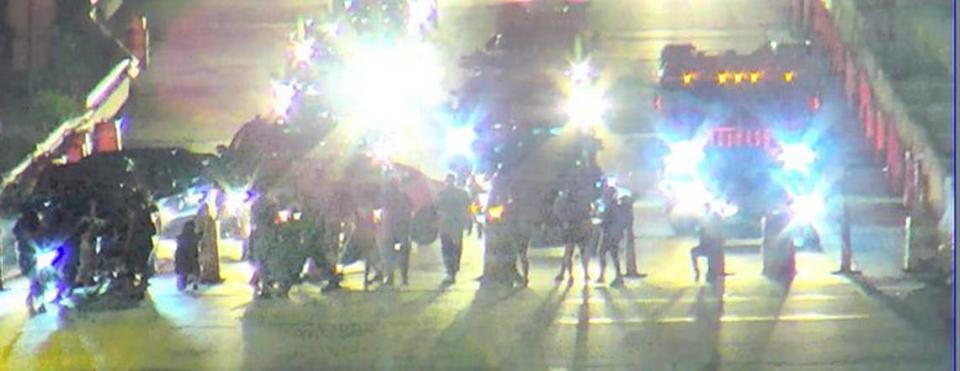Charlotte protests: CMPD investigates complaints cops blocked lawyers from clients
Police in Charlotte say they are conducting an internal investigation after complaints from attorneys on Thursday that they were denied the chance to talk with people who were arrested for blocking traffic on Interstate 277 during a protest.
Charlotte attorney Amanda Wright wrote on Twitter after the experience: “They threatened to use their weapons and arrest us. We announced we were attorneys and showed our bar cards. (Charlotte-Mecklenburg Police officers) screamed they didn’t care and we would go to jail.” Attorney Janki Kaneria with the Mecklenburg Public Defenders office said officers refused to give her information about the people arrested.
CMPD officials responded on social media that the incident is under investigation by the department’s Internal Affairs.
The arrests related to I-277 came late Wednesday, hours after a march, organized by Million Youth March of Charlotte and Salisbury, and a vigil for George Floyd in uptown ended.
Five people were charged, accused of blocking traffic on the interstate with traffic cones, according to CMPD. It was the 13th night of continuous demonstrations in Charlotte following Floyd’s death. A police officer in Minneapolis has been charged after pressing his knee into Floyd’s neck for nearly nine minutes.

Thursday was a quieter scene in uptown. A group of about 30 to 50 people began marching from First Ward Park around 8:30 p.m.
Earlier, many other people gravitated toward a large Black Lives Matter mural painted on the pavement on Tryon Street in uptown.
“This one block is where we can just enjoy without any negativity,” Norman Respass, 59, said. “Everything here is positive.”
Respass, a California resident, was sipping a whiskey and Coke from a nearby restaurant patio watching people who stopped to take pictures with the street art.
“It’s a good thing,” Respass said, surveying the scene. “It’s change.”
Civilian Bike Squad pedals for peace at Charlotte’s George Floyd protests
Marlisa Douglas, 39, and her daughter Jazmyne Cortese, 21, spent the evening dodging traffic to get a photo in front of the mural.
“I had to see it for myself,” Douglas said. “I want something to hold on to. It gives me a little bit of hope that maybe change can come from this.”
“It’s time that we are treated equally,” Douglas said.
Douglas and Cortese said they haven’t been marching in Charlotte, but when protesters walked down the street around 8:30, calling on others to “walk with us,” they joined in.
In front of the jail, volunteers with Charlotte Uprising set up tables and continued jail support services to help people who are arrested after leaving the jail.
Keith Jones said he knows two of the people who were arrested late Wednesday. He’s been part of protests most nights since May 29, he said, but was not on the interstate Wednesday and didn’t witness the arrests.
Still, Jones, 18 from Boone, said he is unhappy with how some officers have treated largely peaceful protesters in Charlotte.
“When they’re not here, its more peaceful,” Jones said.
CMPD officials point to the department’s “constructive communications team” and other initiatives in recent days as ways the department has tried to both support peaceful protests and respond to criticisms. Since the protests began, the department has introduced new policy to require officers to intervene if they witness police brutality and Charlotte City Council has moved to stop funding police use of chemical agents as a form of “riot control.”
‘A lot of hope’
Akobe Ayotunde, 48, said he visited uptown Thursday night to support protesters calling for an end to police brutality and profiling of black people. After 14 days of demonstrations, marches and more, Ayotunde said he sees a marked difference in recent days in protest activity.
Early on, he said, “it seemed the police were a little aggressive in the beginning. It seems that aggression has whittled away some now.”
Ayotunde is from New York but has family in Charlotte and says he now hopes to move to North Carolina. He wants to continue being active with community groups, he said.
“I’m happy with that change because now we can come out, and if the numbers get bigger, we don’t have to worry about them (police) being a threat. We don’t have to worry about being tear-gassed. It’s changing for the better.”
Ayotunde said he’s happy to see a diverse crowd of people participating in the Black Lives Matter movement. Having white people attend the protest, especially, is a sign of unity, he said.
“That’s touching. It fulfills a lot of hope for me. The world can change and people can do better. It gives me joy to see us all as one voice, one community.”
Observer staff member Anna Douglas contributed.

